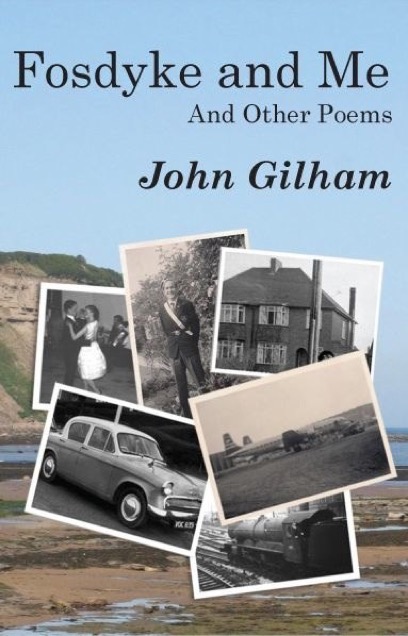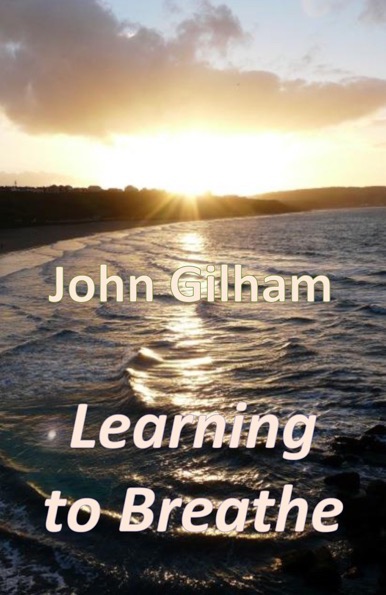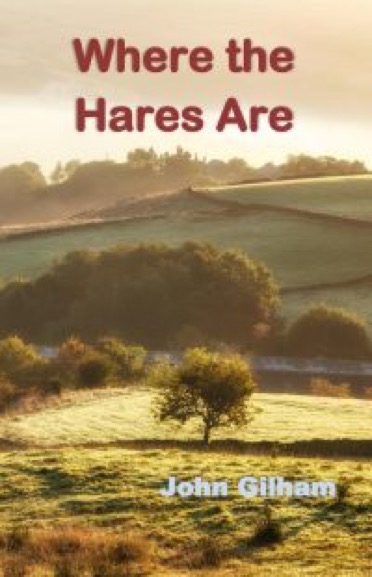FOSDYKE AND ME AND OTHER POEMS
Reviews and poetry excerpts below.

FOSDYKE AND ME AND OTHER POEMS
Reviews and poetry excerpts below.

LEARNING TO BREATHE
A few extracts from the book below:
FOSDYKE AND ME
The reason the West Middlesex Boys' Brigade football team
Never won a match was Fosdyke and me.
Week after week Fosdyke and me would stand there in the
freezing rain,
Peering through the West London gloom to where
The tall, lithe, athletic, skilful, bodies of our team-mates
Leapt and plunged after the entirely unpredictable movements
Of a small, sodden, leather mass that me and Fosdyke
were there to stop.
Right back, him, and left back, me.
We got agitated when figures loomed out of the drizzle,
coming our way.
Fosdyke and me would paw the ground like nervous thoroughbreds,
Dash this way and that, look threatening behind our NHS specs,
Though our legs, I seem to remember, developed all the elegance
of a new-born giraffe
As the ball was tapped expertly between them and on towards goal.
Every Saturday me and Fosdyke used to cycle out to some
forgotten field,
No changing rooms, no bogs, no spectators, except dogs,
(Who'd cock their leg on your bike),
And spend an afternoon being shouted at, pushed in the mud, or told by the goalkeeper to
"Leave it to me!" just when we might have had a kick at it.
Fosdyke and me were responsible, I'm sure,
For our Captain's permanent sore throat, instructing us
from a distance.
"Cretins" he called us, which wasn't polite, or p.c., but understandable,
Unlike "Mark your man!" or "Lob!"; and the offside rule
eludes me still,
Though I was shouted at about it quite a lot.
Fosdyke and me got elbowed aside quite a lot too,
If not by the casual thundering force of the opposition
So that by the time I'd cleaned the mud off my glasses
They'd scored another three goals,
Then by exasperated members of our own team,
Desperately trying to save the day.
Stopping me and Fosdyke getting the ball got to be quite important for our side.
Usually, we lost ten-nil or so, though once it was only one - nil
When the other side had only six men.
Me and Fosdyke used to commiserate between spurts of action.
"Only another seventy-three minutes to go."
We didn't always remember to change ends at half time
And when our glasses steamed up and our knees froze
beneath our shorts
And everything else beneath our shorts as well
(It’s a miracle we didn’t end up eunuchs)
And we'd been knocked over and trod on and shouted at
for nearly 90 minutes
I sometimes used to wonder why me and Fosdyke were there at all.
Except that I knew. They needed us. We made a full squad.
No-one could ever say the West Middlesex Boys' Brigade
Was two players short of a football team.
Fosdyke and me and football remained strangers to the end,
Even when we both simultaneously slide tackled a player
coming out of the mist
And it was the referee, even when, once, we scored –
and it was an own goal,
They knew we were loyal and dutiful, me and Fosdyke.
And we kept going one whole season, even though no-one ever said thanks
Or "Well-played" (which anyway would have been a lie)
Fosdyke and me, we had our day.
There are other poems in the book too, of which this is an example. I love visiting Germany but every now and then there's a chilly moment, when I realise that there is no building in this town that predates 1945, or, as here, when a name has a particular resonance.
Getting There
After Köln, where the smell of cabbage drifted across the station,
we sped south, threading the tidy streets of Bonn
like an intrusion on a maiden aunt, until suddenly
vineyards appeared, knitted up the hillsides,
ribbed experiments in colour choice,
folded to let a castle (ruin, museum, smart hotel) adorn a rock,
while on the Rhine, dashed with white like a mountain stream,
Europe’s barges battered the waves.
Later, from a high apartment, we watch as darkness falls:
lights move and sway as if we are still voyaging -
an inland sea, a Brio set, crossing and recrossing the fields
with bright skeins of earnest travellers,
patterns in light, a country on the move.
And we move too, on clockwork trains,
past peaceful woods, fields of dry corn, and bare orchards.
We visit quiet towns, cafés with cakes you might die for,
or from; sausages and sauerkraut, paving, baroque altars,
and litter pre-sorted, purposeful, neat.
We drive, we visit friends, we see the sights;
but in one place, on a farm wagon a tarpaulin
and a name – Mengele – angel of death,
strikes like a shard of ice impaling the heart.
I think “farm machinery firm” – in vain.
Here lies the poison of history:
it chills these golden hills;
it lurks behind the smiles.
We cannot avoid what we inherit -
but we must know it for what it is and how it shapes us.
The town to which we return, have dinner
with friends who live there,
in ‘45 was rubble on the map
And this, below, which says just a little about the human spirit.
Of Course, It Goes On,
Even in bombed cities people need bread;
the peach crop, spared by the night’s bombardment
must still be sold, or rot;
and the butchers killed their meat yesterday;
life goes on.
The market buys and sells, though the soldiers
dart from cover to cover a block away.
and each morning, after the blitz,
we stepped over hosepipes to our offices.
Where the twin shadow fell but yesterday
the coffee shop re-opens.
For this is the affirmation:
this is how we say
that you who love war
cannot destroy us.
The bombed grocer who is “more open than usual”;
those who make love in the shelter;
the girl going to school past the burned out tank;
the mother who sings her child to sleep
through the stutter of gunfire, with songs
that are centuries old - of course, it goes on.
Out of the rubble we crawl with our violins,
our scraps of poetry, our cooking pots
and shopping bags; starting now
to rebuild what makes us human,
defying the teeth, the wolves of war.
John Gilham has had poems published in a wide variety of magazines, including The Rialto, Acumen, the North, Pennine Platform, and Dream Catcher. He has won a prize in the Ilkley Literature Festival Competition and the Arvon/Daily Telegraph Poetry Competition where his entry was highly commended. As well as in his collection (above) his work has appeared in several Stairwell Books anthologies, for example The Green Man, The Exhibitionists. Most recently he has had 3 poems included in Gathered-Contemporary Quaker Poets, published in the US by Sundress Publications.
John is a regular contributor to the Spoken Word open mic at the Exhibition pub, Bootham, York, on the first Tuesday of every month from 7.30. He also reads his work at other open mics and poetry events in the Yorkshire area. He will be happy to be asked to read at other venues also.
Following the retirement of Paul Sutherland as editor of Dream Catcher, John joined the new editorial team for the magazine and has been the Editor from Issue 30 onwards.
The following review by Julia Deakin of Fosdyke and Me and Other Poems appeared in "The North".
“John Gilham is another mature writer whose alter-ego Fosdyke takes us back to the 60s for a rite-of-passage in a gauche style which at first is worrying. Turn to the back though to see where he ends up poetically and you'll find 'The Winter Lovers' reassuringly spare, lyrical and tender. So bear with Fosdyke and let him draw you into a picaresque lurch from boys' brigade to bedsit, Cawood to Carnaby Street, pubes to Paris. This is engaging, the stuff of great radio and a pretty good poem too.
The rest of Fosdyke and Me is a more serious take on the last fifty years, moving from Humberside pastoral to his family's European roots, mostly in free verse with discreet internal rhyme, although the rhymed couplets of 'Mr Hoffman' also work well. 'Of course, it goes on' evokes Auden:
Even in bombed cities people need bread;/ the peach crop, spared by the night's bombardment,/must still be sold, or rot
and
Out of the rubble we crawl with our violins,/our scraps of poetry, our cooking pots / and shoppng bags, starting now / to rebuild [...]
Such lines are so effective they probably don't need the further explanation they sometimes get. Wit lightens darkness throughout; both he and Chatterjee [also reviewed ] have great takes on train tannoys - new sub-genre?”
Andy Humphrey also has also reviewed “Fosdyke and Me...” in his wide-ranging blog:
http://poets-soapbox.blogspot.co.uk/2012/08/review-fosdyke-and-me-and-other-poems.html
It’s a detailed and thorough review, by a practising poet and frequent competition winner, so well worth the read. A Few headline extracts below:
“effective, atmospheric writing”
Of the Other Poems: “what makes these poems really noteworthy is the way the author connects the microcosm of domestic life with the reality of a Europe discovering its freedom in the years following World War 2. Mr Hoffman, a beautifully constructed modern sonnet, is a perfect example”.
“the whole collection [is] a moving and compelling piece of work which repays reading again and again.”

John Gilham has an acute sense of the interpenetration of history, religion, geography, the stories that landscapes tell, and the contemporary world.
“The enchanted sword that wins the day;
the knife outside the take away.”
The Boundary
And was this the border of Elmet,
a ridge, defensible, stretching up
from the washlands
with their stocks of winter geese,
of ducks, a hunter’s harvest;
and did it protect too, the ford
where the Romans later set their stamp
and left their name?
I walk this path and with one step
straddle two counties, can follow by eye
the line that links the highest points,
that picks up features
no-one would know (or care) how old they are,
indifferent as the kestrel that glides
from the field into the wood, targetting
some small rustling in the next kingdom.
Our world, ordered from remote offices
was carved by men with ploughs and axes,
smoothed by women planting, harvesting,
teased from one where kestrel, goose and duck,
took their territories from distant gods
who also made the hills, the rivers, and the ice.
WHERE THE HARES ARE

In his third volume of poems John Gilham ponders his place in the world: child of the war-wracked 20th century facing the environmental challenges of the 21st, yet finding enough to celebrate in close observation of the natural world, in the music of cities, the exhilaration of weather and the power of love. Memory is a “two-edged sword”: it is both a “disease we must survive” and “lifts the heart”. Transitions, crossings, borders fascinate him. Fear and despair wrestle with moments of joy and revelation.
Balancing
is about not falling, having fallen before
it’s about treading a line, soberly
about leaning just so close
to a fall from grace
as caution and restraint allow
it’s not easy, though I know how